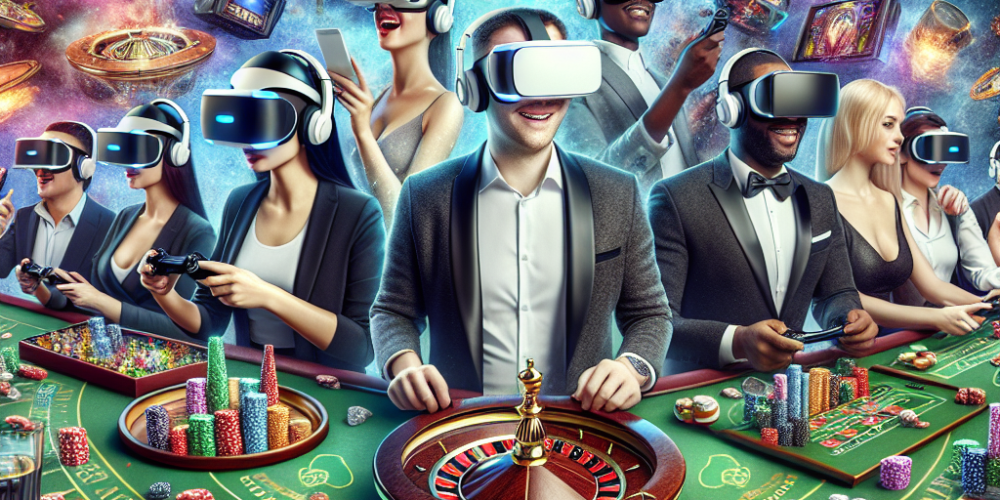The gaming industry is witnessing a significant transformation with the integration of Virtual Reality (VR) into casino gaming, marking a thrilling evolution that promises to bring the immersive casino experience to players’ living rooms. This pioneering technology is not just revolutionizing how players engage with games but also reshaping the very fabric of gambling entertainment.
Virtual Reality technology, once a futuristic fantasy, has now become a tangible reality, particularly in the realm of gaming. VR allows players to immerse themselves in a three-dimensional environment that mimics the physical presence of being in a traditional casino. This technological leap is not only enhancing the player experience but also broadening the scope for developers to innovate within the gaming arena.
Recent advancements in VR hardware, such as improved headsets with better resolution and tracking capabilities, have catapulted VR casino gaming into the limelight. Companies like Oculus and HTC are at the forefront, offering devices that provide an unmatched level of immersion. The realism these devices deliver has become a key selling point for those looking to experience casino gaming in a whole new way.
In the world of VR casinos, players can stroll through realistically rendered casinos modeled after real-world counterparts like those in Las Vegas or Macau. The ability to interact with environments, handle chips, pull slot machine levers, and even converse with other players or dealers in real-time transforms the virtual gambling experience into something remarkably close to the actual thing.
One such example of a VR casino platform is ‘Casino VR Poker,’ where players can enjoy a fully interactive poker game, offering them an opportunity to read their opponents’ body language and engage in live chats, enhancing the social aspect of gambling, often missing in traditional online platforms.
Moreover, casino operators are keen on incorporating VR technology due to its potential to attract a younger demographic. Millennials and Gen Z players, familiar with virtual environments and gaming, are more likely to be drawn to VR casinos, which provide both the thrill of gambling and the engaging experience of video gaming.
Economically, VR casinos could also signify a more cost-effective way for new operators to enter the market, circumventing the high overhead costs associated with physical casinos. This aspect could significantly alter the competitive landscape of the gambling industry, introducing more players and diversifying what casino entertainment means.
Regulatory frameworks, however, are still catching up with these technological advancements. Jurisdictions that allow gambling are now faced with the challenge of integrating new rules and regulations that address the unique aspects of VR gambling. Issues such as ensuring fair play, preventing underage gambling, and managing cross-border gambling are complex in virtual settings. Therefore, the future growth of VR casinos will heavily depend on legal adaptations as well as technological advancements.
In terms of market response, the adoption rate of VR casino gaming has been promising. According to a report by Grand View Research, the global virtual reality in gaming market size was valued at USD 11.56 billion in 2019 and is expected to grow at a compound annual growth rate of 30.2% from 2020 to 2027. This growth is indicative of the increasing desire for immersive and innovative gaming experiences.
As we look towards the future, the potential for VR casino gaming is boundless. Not only could we see a greater variety of games being offered, but also more integrated social features, perhaps even linking VR gaming platforms with social media sites to enhance user engagement and community building. Furthermore, the advancements in VR technology such as haptic feedback suits, which allow players to feel the game, promise to deepen the immersive experience even further.
In conclusion, VR technology is not merely a passing trend in the casino industry; it represents a significant shift towards a more technologically advanced, immersive, and socially engaging form of gambling. For both consumers and operators, the stakes are high, and the possibilities, limitless. As VR continues to bridge the gap between virtual and reality, it paves the way for a new era of casino gaming, setting the stage for what could be the next big revolution in the gambling world.

David Farbacu is a seasoned writer with a passion for games, gaming, casinos, and Xbox. With a wealth of experience in the industry, David brings insightful reviews, comprehensive guides, and engaging articles that cater to both casual gamers and hardcore enthusiasts. His expertise spans across various gaming platforms and genres, making him a go-to source for the latest trends and developments in the gaming world.

